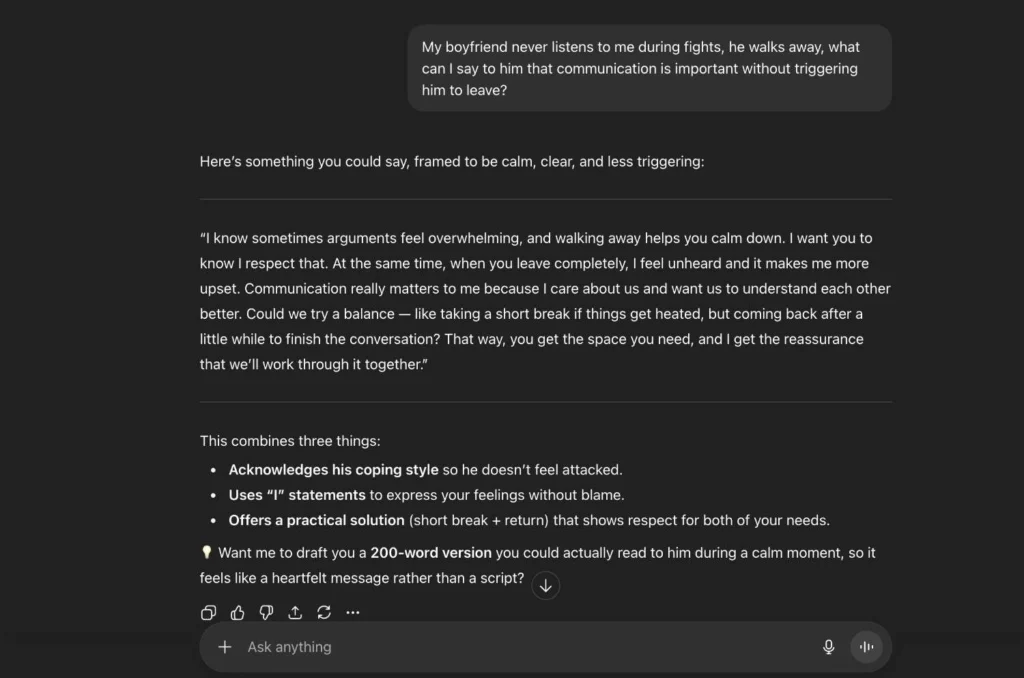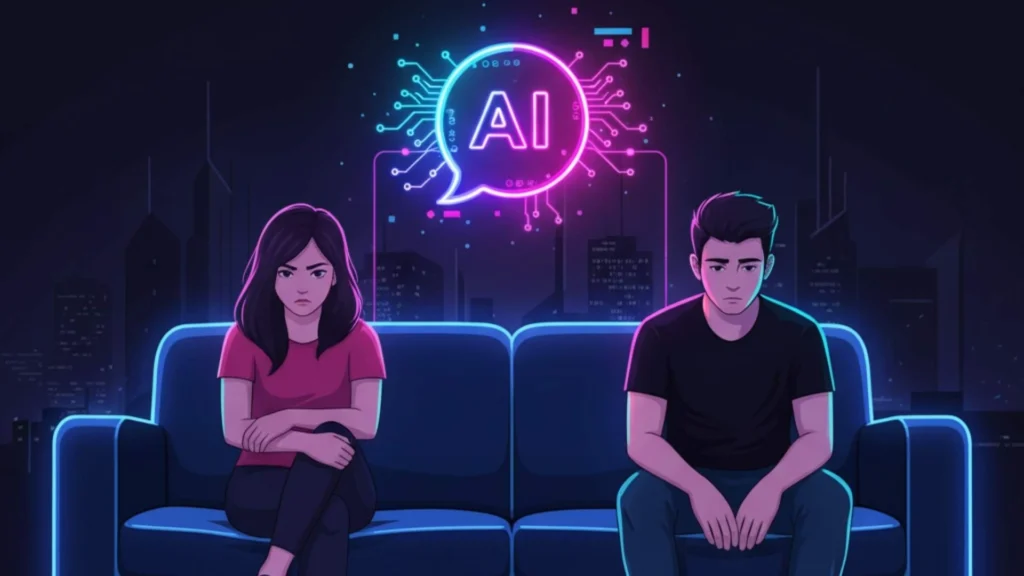It's late. The dishes sit in the sink again, the bills are past due, and the same argument you've had ten times this month hangs in the air. One of you is sick of nagging. The other is sick of feeling attacked. Voices escalate, doors slammed, and the evening dissolves into silence.
But some couples are breaking that cycle in a modern way. They're not calling a therapist or complaining to friends. They're opening a chatbot, trying to use AI for couples therapy as a means to practice healthier conversations.
“Rewrite this so it doesn't sound like blame.”
And then, what was “You never help around the house” turns into “I feel closer when we do chores together. Can we make a plan together?”
It's not therapy. But sometimes, it's enough to keep the argument from boiling over.
One Redditor in r/TalkTherapy even imagined a true three-way session:
“We could both chat with the AI, not just one at a time — like real couples therapy.”
Why Couples Are Turning to AI Instead of Therapy
Couples therapy is effective. But let's be real, it costs money, is difficult to access, and for many, still carries stigma. It can cost $100–200 per session, and waiting lists are weeks long.
AI is the opposite:
- Instant – no appointment required.
- Cheap – usually free or less than $20/month.
- Private – no stigma, no embarrassment.
Researchers are already examining this transition. An article in Current Research in Behavioral Sciences discovered that ChatGPT was able to redefine conflicts and offer reflective responses that participants rated as useful in couples counseling contexts. Another study discovered that in some contexts, individuals actually found chatbot answers to be more compassionate than from human specialists
For couples stuck in perpetual cycles of “you never” and “you always,” even the slightest move toward gentler language can be transformative.
This sense of emotional security is not exclusive to couples. People are now also using AI friend apps to combat loneliness. These, too, offer a comparable non-judgmental space for connection when human support feels out of reach.
How to Use AI for Couples Therapy Step by Step
Consider a chatbot more of a scriptwriter and less of a shrink. It will not fix your relationship, but it can assist you in finding words that won't hurt as much.
Here’s a simple framework couples are already using:
Step 1: Put the conflict on paper(Write it down)
“You never clean around the house.”
Step 2: Have AI rephrase it
Prompt: “Rephrase this so that it conveys my emotions without blame.”
AI: “I feel less anxious when we divide household work. Can we make a plan together?”
Step 3: Roleplay the other side
Task: “How could my partner reply empathetically?”
AI: “I didn't know you felt like that. I will try to do more.”
Step 4: Practice together
Both partners attempt the AI's wording. Refine it until it sounds natural and each of you feel understood.
Step 5: Reflect
What sounded right? What didn’t? Which phrases felt easier to say?
This process doesn't replace conversation. But it cools the emotional temperature, often enough to break cycles of blame and defensiveness.
People are already using AI as rehearsal space. One user posted:
“I’ve been using an AI chatbot to process things after sessions… It’s helped me clarify what I want to say.” (Reddit)
That mirrors what couples report too: AI gives you a place to vent and rehearse before going to your partner.

The Strengths of AI for Couples Therapy
- It de-escalates charged speech. From “you never” to “I feel” reduces defensiveness.
- It interrupts repetition. AI offers new scripts rather than rehashed arguments.
- It provides space for emotions. Writing to a robot provides a cooling-off time before they confront each other.
- It feels private. Couples may practice vulnerability with AI first before risking it in person.
A thematic analysis published in Frontiers in Digital Health discovered that individuals tend to mould ChatGPT into a “digital therapist,” using it to practice emotional disclosure in ways they would not do with friends or partners
The Risks and Limitations
- No deep context: It doesn't know your history, trauma, or unspoken dynamics.
- Bias: Models can accidentally “take sides,” reflecting hidden training data.
- Triangulation: Therapists caution against couples outsourcing emotional labor to AI, making it a “third wheel” rather than communicating directly with each other. (Connect Couples Therapy).
- Over-reliance: Couples risk having AI script too much, sabotaging actual communication.
- Privacy: Except when encrypted, private conversations might not be safe.
Stanford researchers warn that while AI can offer quick answers, it lacks the judgment and ethical safeguards of experienced mental health professionals. In mental health contexts, misuse could even be harmful
Inside the Lives of Couples Turning to AI for Help
- A Los Angeles couple gave credit to ChatGPT for saving them from divorce. By putting arguments about parenting through the bot, they shifted blame into constructive requests, de-escalating tensions.
- Wired documented a retreat where human couples interacted alongside AI companions. Some found chatbots effective mediators, others felt uncomfortable. The experience underlined both the promise and the messy reality of integrating AI into intimacy.
- On sites such as Reddit's r/relationships, users now post about running texts through ChatGPT before hitting send. Some report it keeps fights at bay; others joke that their “relationship therapist” is now a machine.
Best Practices: How to Make AI a Help, Not a Hazard
If you’re curious to try this, here are some guidelines:
- Tell your partner: Don’t secretly filter arguments through AI. Transparency matters.
- Be particular: Vague questions result in vague recommendations.
- Be yourself: Use AI language as a guide, not a cut-and-paste.
- Review tone: Does the recommendation really sound like you? Edit accordingly.
- Know when to move on: If arguments become circular, if trust is betrayed, or if fundamental issues arise, refer to a human therapist.
What Tomorrow’s AI Relationship Tools Might Look Like
In the future, specialists envision hybrid models:
- Pre-sessions with AI: Couples record frustrations into chatbots, which summarise contexts for therapists.
- Mood tracking: AI could find recurring patterns of conflict over weeks.
- Custom couple-bots: Think of a personal AI trained only on your shared conversations.
A few initial experiments already indicate that AI can compete with human therapists in narrow contexts. According to a 2025 study released in PLOS Mental Health, volunteers scored ChatGPT's therapy-like answers higher than licensed psychotherapists in a few vignettes.
AI isn’t just being used for conflict. Some couples are exploring intimacy through chatbots too, with tools highlighted in this guide to the best AI sexting apps.
At the End of the Day, It’s About Words
AI couples therapy isn't actually therapy. Yet as a practice tool, it's unexpectedly powerful.
It provides couples a neutral practice space to experiment with tone, shift blame, and confront difficult topics with less heat.
It won't heal deep wounds, it won't substitute for therapists, and it's no cure all. But for daily conflicts, the arguments over chores, unseen texts, incompatible schedules, AI can be that surprise partner that encourages couples to communicate rather than yell.
And perhaps that's the most under appreciated type of therapy, simply finding better words.


